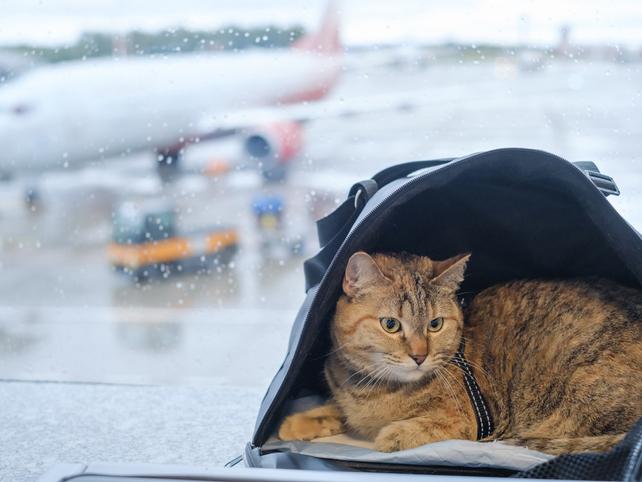
Zoom fatigue and other exhaustions of international academic life

You may also like
Seven years ago, I left my home country. First, I went to a major research centre in Berlin. Then, in Kazakhstan, I helped develop the curriculum and policies of a recently established university. My new position in the USA affords me different possibilities. Moving internationally gave me opportunities I might not have gotten at home in the UK.
You could say I left for these opportunities, but I also left because of the academic job market. Simply put, I had little choice if I wanted to stay in academia. I have been on the job market almost continuously for the past 11 years. I am constantly having to choose between keeping my career or going home. I may never be able to do both. For now, at least, I have chosen my career. But that comes with its own stressors.
How do you fly around a war zone with a cat?
A single international move can easily cost thousands of dollars, and most universities are not going to cover all of that – if they cover any of it at all. To get from Central Asia to Middle America – almost halfway around the world – I had to pay for flights and a shipping company, book short-term and then long-term accommodation, and find furniture. And this before being paid a single dollar.
- Why we should be humans first and academics second
- What is tenure – and how to get it
- The cruel optimism of research careers: how to support contract workers
Then there is the mental cost. Any move like this comes with a huge amount of decision fatigue, along with the regular fatigue. How do you fly from Kazakhstan to Indiana during a pandemic around a war zone with a cat? What health paperwork do I need? What does my cat need? Which shipping company is best or cheapest? Which of my possessions am I sufficiently invested in to take with me, and which should I purchase again once I arrive? Which bank should I use, which supermarket and where should I live? How in the hell does anyone navigate the US visa process? It’s a constant deluge of choices to make: from things that could derail the entire process to simply how to find a sandwich.
Many people do all this without a support network. When I moved to Kazakhstan, I had never been to the country before and knew one person, who left six months after I arrived. I know precisely no one in the entire state of Indiana. My nearest friends live 1,100 kilometres from here. And knowing that invokes something like claustrophobia or vertigo, a sudden breathless feeling of isolation as you are reminded that there is no one, no one at all, who you know.
You meet people locally, but it’s never the same. You can’t laugh with them about that former flatmate you both had and their weird opinions on sofas. You introduce yourself to new colleagues, over and again. At best, it’s academic-friend speed-dating; at worst, a months-long addendum to the interview – a feeling of pressure to be bright and shiny for your bosses when you may feel anything but.
Colleagues might be sympathetic, but universities as institutions are often as uninterested in the stress and expense of moving as they usually are about faculty well-being. If we are teaching our classes, we must be fine. Institutions, we’ve been warned before, will never love us back.
Constant dislocation and Zoom overload
I am so tired. More than anything, I am tired of the constant dislocation of it all. I want to be able to text an old friend and meet them in the pub that same evening. I want to have a real conversation – not just a “Hi, how are you?” – with someone I don’t work with. I am sick of cross-time-zone WhatsApp conversations that are like telegrams, sent out in one person’s daylight and replied in another’s. I am jaded by the close yet impersonal nature of social media. And I am absolutely fucking sick of Zoom.
I remember meeting an older colleague who had just retired from the university that hired them straight out of grad school. They never worked anywhere else in their whole career. Technically, that can still happen. There are unicorns in the world. But for most of us who decide to stay in academia, we’ll go through multiple institutions before being offered a job that could perhaps be permanent.
For the rest of us, we are a generation of academics shuttled from contract to contract, institution to institution, country to country, never quite able to build up a local support network, put down roots and make a real home. And when we retire (if any of us will be able to afford to retire), where will we go? Back to a place we haven’t lived in decades, to find a town where, once again, we won’t know a soul?
How scholars can cope with an international move
So, here are my thoughts on coping, from long experience:
- Social media and phones are good, actually. Mental health experts love to tell us to put away our phones and log off Twitter, but if you know no one for miles around, that’s not practical and it’s not helpful. Text your friends. Connect with communities on message boards. Put cute pictures on Instagram. Use our substantial technologies of communication to communicate.
- Find local community. And, no, not just with work people. Hopefully, you will have cool and lovely colleagues, but you need other people to interact with. Seek out websites, Instagram accounts, Facebook pages maintained by running groups, knitting circles, religious institutions, rock-climbing groups. Use the online to find the offline.
- Love where you are. Everywhere in the world has something good, maybe even something great, about it. Maybe you’re near a beautiful forest. Perhaps there are excellent restaurants in town or cool street art. Find the local thing that brings you joy and enjoy it whenever you can.
- Make a home, whatever that means for you. Love cooking? Buy one great pan and invite people for dinner. Book lover? Decorate your place with your favourite books, lined up in full view of the sofa. Colours make you happy? Get neon gel pens or removable wallpaper or a beautiful plant. Make the place you’re in feel good to be in right now, even if it’s not where you want to be forever.
Clare Griffin is a mental health advocate, fiction writer, historian and assistant professor for Russian history at Indiana University Bloomington. Her latest book is Mixing Medicines: The Global Drug Trade and Early Modern Russia (McGill-Queen’s University Press, 2022).
This article was originally published in July 2022 on Voices of Academia as “The eternal dislocation of academic living”.
If you would like advice and insight from academics and university staff delivered direct to your inbox each week, sign up for the Campus newsletter.


